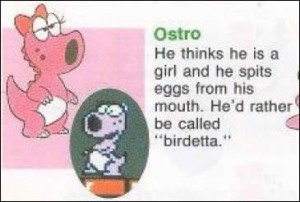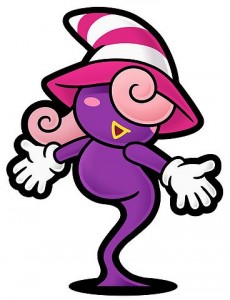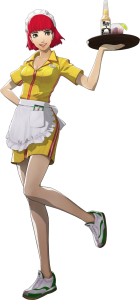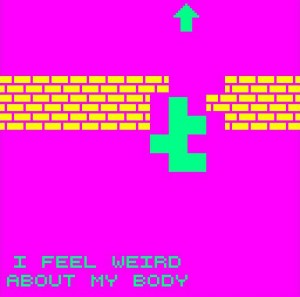Let’s Talk About Birdo
- Updated: 7th Apr, 2013
[I would like to preface this article by stating that while its focus is on male-to-female transgender individuals, this is due to a combination of personal experience, visibility during transition and available examples, and is not meant to diminish the struggles of female-to-male transgender individuals]
 Birdo seems to be a bit of a running joke in the video game industry, often swept under the rug to avoid a conversation society doesn’t want to have. We’ve all at some point heard the vague chatter, the muddled use of language and the debate surrounding that character bio in the Mario Bros 2 manual that was largely ignored going forward. I’m fairly confident in my opinion on the matter, Birdo is a male-to-female (MTF) transgender character who in many ways epitomises why this industry so often has issues with trans people joining its ranks.
Birdo seems to be a bit of a running joke in the video game industry, often swept under the rug to avoid a conversation society doesn’t want to have. We’ve all at some point heard the vague chatter, the muddled use of language and the debate surrounding that character bio in the Mario Bros 2 manual that was largely ignored going forward. I’m fairly confident in my opinion on the matter, Birdo is a male-to-female (MTF) transgender character who in many ways epitomises why this industry so often has issues with trans people joining its ranks.
I’m getting ahead of myself a little so let’s take a small step back. What we in the West know as Super Mario Bros 2 is a re-skinned port of a Japanese-only game titled Doki Doki Panic. Nintendo characters were slotted into the four playable character slots, but the enemies largely remained unchanged in the game’s journey overseas, bringing with them Birdo. In the original printing of the game’s manual her character description read as follows.
“Birdo thinks he is a girl and likes to be called Birdetta. He likes to wear a bow on his head and shoot eggs from his mouth”
Nintendo of both Europe and America quickly changed this description in later printings, leaving Birdo as firmly female. She would go on to be placed as Yoshi’s love interest throughout Mario canon and as far as Nintendo in the west were concerned, Birdo was living happily as female.
You might be wondering why this is important. It’s important because Birdo has succeeded in what the vast majority of transgender individuals aspire to achieve; living stealth. Nobody who sees Birdo in a game for the first time today knows that she was born male, and nobody harasses her for her past. She blends in naturally as a woman and doesn’t draw any attention to her status as transgender.
Because the vast majority of transgender people aspire to live a stealth life in their newly-acquired gender, there are very few advocates for rights or representation in the industry. That leads to a self-fulfilling cycle, where transgender characters will rarely be well-represented in games, and transgender people working in the industry will always get treated the same.
The Negative Effect On Games
Birdo isn’t the only character in a video game to have ever been discussed as transgender, but the other examples I have are each notable for different reasons that raise some interesting points about the way our industry views transgender individuals. First up, a female character in Final Fight. When Final Fight was released in Japan, one of the bosses your male character had to fight was a woman named Poison. When the game moved to the NES in the West, people started to raise objections to beating up a woman in a video game. The solution? Make her a male-to-female transgender woman. Remember, beating up women is wrong, but feel free to beat up the next transgender woman you see, they’ve not got enough on their plate already.
 The other notable example, again involving Nintendo’s English language localisation, is the 2004 game Paper Mario: The Thousand-Year Door for the Gamecube. Vivian, the youngest member of the Shadow Group, is described in her description as “”One of the Shadow Group, Vivian appears to be a girl but is really a boy”. Her sisters at times call her a man as a way to insult her and the game generally presents her as female, but having previously been male, and implying that because of that she is not truly female. Naturally, this was again removed in the English version, where she is referenced simply as female.
The other notable example, again involving Nintendo’s English language localisation, is the 2004 game Paper Mario: The Thousand-Year Door for the Gamecube. Vivian, the youngest member of the Shadow Group, is described in her description as “”One of the Shadow Group, Vivian appears to be a girl but is really a boy”. Her sisters at times call her a man as a way to insult her and the game generally presents her as female, but having previously been male, and implying that because of that she is not truly female. Naturally, this was again removed in the English version, where she is referenced simply as female.
Games That Get It Right
When someone suffers with gender dysphoria, they live life feeling like they were born physically one gender and mentally and emotionally the other. It’s something very hard to live with and even harder to understand from just an explanation. Most people will never know how it feels to want to make the difficult journey from one gender to the other, or how it feels to be discriminated against for that matter, but maybe one day games may hold the key to teaching understanding of the suffering involved in transition.
Thankfully, there are a few games out there that have started to do things right in terms of how they represent trans people in games. First we return to Birdo and one of her Japan-only adventures. The game was titled Captain Rainbow and came to the Wii a few years ago. The scene that’s of interest to this discussion revolves around Birdo being wrongly imprisoned for using a female bathroom.
The robot who imprisons her simply does not believe she is a girl and the player is asked to go and find proof of Birdo’s gender in order to secure her release. It’s a video game that tackles an issue faced in the real world by trans people, and should be applauded for it’s presentation of the attitude that transgender women are ultimately still women and deserve to be treated as such, not discriminated against for that.
A fantastic example of a well-developed transgender character, one who passes so well I never picked up on their trans status originally, is Erica, the waitress in Catherine. Throughout the bulk of the game you would never know she had been born Eric, but once this has been revealed in one of the game’s endings, other pieces of the puzzle start to fall into place and parts of the game’s narrative now make sense. From explaining why she faced the same nightmares as the men to helping to explain some of the conversations people had with her through the story, the fact that the main cast knew her pre-transition makes several things clear.
From being told she wouldn’t be able to enter a women’s wrestling team, to having her opinion of how it feels to be a woman disregarded, the cast more than once imply that she’s not really a woman in their eyes and her angry and upset reactions to this do a fantastic job of showing both how upsetting these things can be for someone transitioning, but also how the transitioning person often has to maintain a happy face in spite of comments being made. It sucks having to remain professional in a workplace where you’re being called male pronouns when you’re female.
There are several indie games that directly tackle the subject of transition in an attempt to help people see the other side of the coin. One of the best known examples of this is the flash game Dys4ia. In it, we play through several stages of a specific Trans woman’s experience transitioning. It’s essentially an interactive story of sorts, and just aims to show people how difficult something like going to the bathroom can be when you feel the threat of being attacked for doing so.
You can read an in-depth discussion of the ways that Dys4ia helps those playing it to understand another person’s point of view here.
In a similar vain, Mainichi is a top-down RPG that takes you through a day in the life of a trans woman several times so you can see how different choices affect the way the day plays out. From having every NPC stare and shout at you for daring to walk on the street, to the challenges presented when paying by card before your name change is through, it shows how just a normal day can be a challenge when transitioning. You might try taking a bath, shaving, doing your make-up and taking great care in your appearance the first few times you play the game, but if all of those attempts to pass fail to stop you getting shouted and stared at, how long will it be before you give up and just go out hairy and dirty, frustrated and depressed that your attempts to avoid ridicule were fruitless? These are some of the challenges the game placed in front of me.
In the Flash game Loved, before the actual gameplay begins you are asked for your gender, only upon making your decision you are told that you are wrong. So if you picked ‘man’, your character is instead a woman, and vice-versa. Can you image if this idea was expanded further in future games? Before the game begins the character you design is given a different name and becomes a gender swapped equivalent of yourself. What this would do is it instantly put your character into a body that you don’t want, a character that feels somehow wrong. It doesn’t matter that the game hasn’t changed, but your experience somehow feels different. It could be the first step towards helping you understand the world through a new lens.
Working in the Games Industry
There has been a lot of talk in recent months about objectification of women in the games industry. Whether you think it’s a big problem or not, there are a lot of women who agree they’re judged on their looks rather than their talent. This is a big problem for transitioning people, as appearance can at times be something not traditionally associated with either gender, and the games industry can at times be pretty brutal to people, particularly women who have a large Adam’s apple or struggle to keep their stubble under control.
As a transgender woman trying to break into the games industry, this last year hasn’t exactly been an easy one for me. I always felt different and had issues with who I was growing up, video games were my escape from being me. My escape from being male.
 I could roam the world, saving people as I went, and people always liked me. That was the same whether I named my character Link or Laura, people still saw me as someone to be proud of. I was a huge fan of the Metroid series, where I was able to be an ass kicking hero who was a strong character first and female second. I could explore other lives, sometimes being able to play characters who I felt more at home as. The Mass Effect series in particular was a huge help to me, allowing me to craft and create exactly the kind of person I saw myself as. Unfortunately, when people hear game reviewer, they think man.
I could roam the world, saving people as I went, and people always liked me. That was the same whether I named my character Link or Laura, people still saw me as someone to be proud of. I was a huge fan of the Metroid series, where I was able to be an ass kicking hero who was a strong character first and female second. I could explore other lives, sometimes being able to play characters who I felt more at home as. The Mass Effect series in particular was a huge help to me, allowing me to craft and create exactly the kind of person I saw myself as. Unfortunately, when people hear game reviewer, they think man.
Being any kind of woman in the industry is often reason for sexism, discrimination or being talked down too, but my appearance has been the cause of some truly upsetting experiences in my line work. From the person who cancelled their interview with me on the grounds that “they didn’t want to be seen talking to some lady-boy” to those who’ve claimed that my love of video games makes me fundamentally male at my core (because biological women all hate games) [We really do – Ed.], I’ve faced more than my fair share of instances where despite the name on my press pass, people insist on calling me he, him or sir. I was once even put into a Birdo-style bathroom situation at an event, forced out of the ladies room after suggestions I was a pervert and then had to deal with a fellow writer calling for my ejection from the event.
I’ve been turned down opportunities to do video work and in person interviews based on my voice “being too male”, I’ve had to rearrange transport to events due after being refused access based to being told “the ticket is in a woman’s name… and well… you’re a man.” One event went as far as to write a large M on my press pass in permanent marker after my arrival. They didn’t want people being confused by my name apparently.
I’ve spoken to a couple of other transgender women in the games industry over the last few months who have largely had similar stories to tell. There were a few who agreed to share their experiences with me, but only if they could do so anonymously. I heard stories of women repeatedly being refused interviews based on their non-traditional appearance, I’ve heard from women turned down at face-to-face interviews because they “wouldn’t be suitable for the company’s front-facing image” and even someone whose pitches to include a female character prominently in a game were refused because “you just want everyone to be a woman don’t you, well some of us like the fact we’re men and don’t want our games brainwashing people into thinking they need to be like you.”
 On the positive side, as the industry is largely one geared around who you know as much as what you know, a good majority of people in the industry who have said things about my appearance behind my back at least had the courtesy to be polite to my face and accept me as female. People never know if they’ll one day have to pitch an article to me or if offending me will affect coverage of their company, meaning that it’s in their best interests to remain professional and not damage future contact with me.
On the positive side, as the industry is largely one geared around who you know as much as what you know, a good majority of people in the industry who have said things about my appearance behind my back at least had the courtesy to be polite to my face and accept me as female. People never know if they’ll one day have to pitch an article to me or if offending me will affect coverage of their company, meaning that it’s in their best interests to remain professional and not damage future contact with me.
While it’s not always this way, a good chunk of people who in the outside world might have caused me issues are polite to my face, which makes things easier in some respects. With games being a tight-knit group, these comments usually get to me anyway, but I’d take face to face politeness over open discrimination any day.
I suspect in any industry other than video games I’d probably have a little more ease passing as female. Gaming is easily the most masculine thing people associate me with, my only real hobby that’s looked at as masculine and therefore gaming events are the kind of place people often look assuming they will see mainly men. As such, people are looking for me and they start to pick up on the smallest things they wouldn’t notice just walking by me on the street.
The Whole Convoluted Point of This Article
I came into writing this article unsure what I was really hoping to achieve with it. In the end, the thing that helped me reconcile what point I wanted to make was a tweet I saw in relation to women in games.
For me diversity in games isn’t about me needing to ‘see myself’, but I want an experience that doesn’t feel openly hostile to me
— leighalexander (@leighalexander) March 26, 2013
I’m not calling for all games to include transgender characters, just that games that include transgender characters do so in a way that portrays them respectfully and accurately. I want their past to be subtext, not an excuse to silence critics when a man beats up a woman in a game. I want publishers to acknowledge a character’s transgender status when a game is brought to the West, not sweep it under the rug and minimise its relevance to mistranslations, hearsay and generally negativity. People talk about Birdo not as a successful transgender MTF character but in muddled terms, circling if she was ever male in the first place, if she’s a transvestite and if she is now truly female. Clear up these areas of confusion, be open about the characters you create.
I’m not calling for the whole world of indie devs to suddenly start creating games teaching how it feels to be transgender. I’d love for more people to realise how valuable a tool for teaching understanding games can be, and for that one special developer out there who has the right knowledge to think about taking on the challenge of creating a game that helps people step into that set of shoes.
I’m not calling for every transgender person in the industry to out themselves in order to help visibility of the issues affecting transgender people in the games industry, just that people have the decency to treat me and people like me like a human being. I’m female, I’m not some kind of horrible sexual predator here to get some kind of deprived thrill.
If you’re trans and you’ve faced discrimination in the industry, please try to talk about it openly. If you see someone being harrassed or discriminated for their perceived gender, stand up for them and back up their right to be treated as their target gender. Help shame those in the industry who make the lives of trans writers, developers, designers and gamers that little bit more difficult than it already is.
I’d love to live in a world where there were more transgender people willing to speak up for the issues in the industry, but for now my ramblings will have to do. Help me reach a day where I can just go to a gaming event without having to watch my back just going to the bathroom. Help us reach a day where I and others like me are not routinely discriminated against and made the subject of ridicule by our own colleagues. Help us reach a day where rather than focusing on what I was, people focus on the fact that I grew up loving games, like all of you did too.
If you want to help us reach that day, here are some useful tips on being a good trans ally.

Pingback: Men vs Tropes vs Women in Video Games | Brass Tacks
Pingback: Response to D’Toid Blog Post | Laura - Assorted Thoughts
Pingback: This Is Why Trans People Rarely Speak Up When We're Misgendered | Safe Schools | Desert Cities
Pingback: Laura’s 2013 in HTML Links | Laura - Assorted Thoughts
Pingback: Opinion: Gender Equality & You in gaming | PWGaming
Pingback: The Dos and Don’ts of Trans Representation in Video Games | Laura - Assorted Thoughts